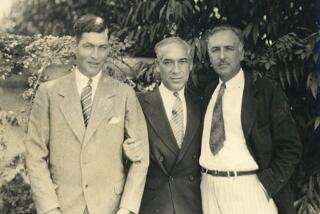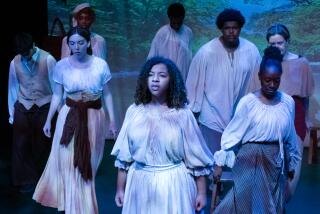Paying Homage to a ‘Prairie Philosopher’ : Stage: Retired minister Robert Dewey of Claremont has written a play about the late Kansas newspaper editor William Allen White.
- Share via
Robert Dewey gets a faraway look in his eye and his voice takes on a certain reverence when he talks about his hometown hero, Kansas newspaper editor William Allen White.
“He was a prairie philosopher, the voice of the Midwest, the quintessential American, really,” said the retired minister in an interview last week in his Claremont home.
Dewey has researched White’s career and read most of the Pulitzer prize-winning editor’s writings. But Dewey takes his esteem for White far beyond polite admiration.
After having alternated between two careers--the ministry and the theater--most of his 68 years, Dewey has spent the last six months on a third endeavor. He has written a play about White’s life, and he plans to portray the Emporia Gazette editor on the stage.
“He was hopeful, optimistic, wise, witty, pithy, and he believed in the nation and in human beings,” Dewey said of White. “I hope to bring him into the national consciousness in the same category as Mark Twain or Will Rogers.”
On a makeshift stage at the Pilgrim Place retirement community in Claremont, Dewey strides across his mostly bare set, pausing before an old roll-top desk that is his only prop.
In rehearsal last week, Dewey affected a crusty good humor as he recited the lines of some of White’s folksy editorials and talked directly to the audience about his colorful life.
White was 28 when he purchased the Emporia Gazette and wrote an editorial titled “What’s the Matter with Kansas?” that attacked the Populists during the William McKinley-William J. Bryan presidential contest of 1896. The editorial was reprinted across the country, and it brought White instant national recognition.
He went on to write 23 books and hundreds of magazine articles and remained editor of the Emporia Gazette for 49 years. Although the paper was internationally recognized, it never had a circulation of more than 8,000 during White’s lifetime.
Dewey started researching and writing his play, “An Evening With William Allen White,” in November, and he still considers it a work in progress. It runs about an hour and 25 minutes, with three parts: White’s rise to fame, his role as one of the Midwest’s most influential journalists and his later years.
Although Dewey has added some of his own dialogue and dramatic settings, much of the play quotes directly from White’s editorials and autobiography. Although it started out as a monologue with White as the only character, Dewey recently added the character of White’s wife, Sallie, to one scene.
The seeds of the play were planted in Dewey’s boyhood in Emporia, Kan., in the 1930s, where White was the local celebrity known for his editorials and his friendship with several presidents.
“I remember him walking down our street, stopping to say hello to my father. He was a member of our church, and sometimes I went to garden parties at his home, which was the highlight of my social life at the time,” Dewey recalled.
His most vivid recollection of White is from a summer day in 1941 that is still seared in his memory.
President Franklin D. Roosevelt had come to Emporia on a whistle-stop tour, and although White was a lifelong Republican, he grudgingly went to the train station to shake Roosevelt’s hand.
“I can still feel the temperature of that warm day,” Dewey recalled. “They brought FDR out to the back of the observation car. I was about 18, and I was wedged up as close as I could get to the whole scene. White went back to his office and wrote an editorial about how ‘The Old Smiler’ had come to town.”
His love of dramatic moments led Dewey to begin acting in Shakespearean plays put on by a nearby college drama department. Had World War II not intervened, Dewey said, he probably would have pursued a professional acting career. But the devastation he saw with the Army’s 8th Armored Division in Europe persuaded him to enter the ministry after his discharge.
He went on to serve in Congregational churches in Michigan, New York and Iowa, and for two years he and his wife lived in South India, where he was chaplain of the Kodai-kanal school for missionary children. Between 1967 and his retirement in 1987, Dewey was dean of the chapel at Kalamazoo College in Michigan.
But during all those years, Dewey never forgot his love for acting. Whenever he got the chance, he directed plays for his students and he took roles in summer stock and college productions.
“I’ve always felt that religion and drama were two sides of a coin,” Dewey said. “Both deal with the meaning of life and the ultimate questions of life and death. Good liturgical religion is great drama, and great drama is ultimately religious because it asks us why we are here.”
No one ever openly questioned the seemliness of a minister appearing on stage, he said. “I suppose some of my colleagues thought it was a little frivolous for the dean of the chapel to trod the boards,” he recalled.
“And of course, some of the people of Kalamazoo did not appreciate the language in some of the plays, when a character might say, ‘Oh, God.’ Of course, I claimed it was really in prayer.”
Since he and his wife, Eleanor, moved to the Pilgrim Place retirement community for church workers and missionaries in Claremont two years ago, Dewey has taken over the residents’ acting group and rewritten the annual Pilgrim Pageant.
He plans to perform “An Evening with William Allen White” for the Pilgrim Place residents and some of his friends this month in free preview performances, which he hopes will give him the input he needs to continue to revise the production. Eventually, he said, he hopes the play will be published, and he would like to perform it professionally for the public then.
As he ran through his lines last week, he stopped suddenly. “It’s amazing,” he said. “As I’ve worked on this I’ve started to think I bear some resemblance to him (White).”
He paused dramatically, then clutched his stomach. “It’s the paunch,” he said dryly.
More to Read
The biggest entertainment stories
Get our big stories about Hollywood, film, television, music, arts, culture and more right in your inbox as soon as they publish.
You may occasionally receive promotional content from the Los Angeles Times.










